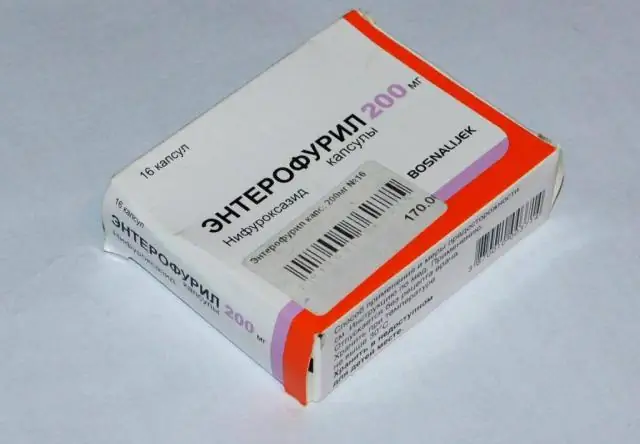- Author Rachel Wainwright wainwright@abchealthonline.com.
- Public 2023-12-15 07:39.
- Last modified 2025-11-02 20:14.
Metamax
Metamax: instructions for use and reviews
- 1. Release form and composition
- 2. Pharmacological properties
- 3. Indications for use
- 4. Contraindications
- 5. Method of application and dosage
- 6. Side effects
- 7. Overdose
- 8. Special instructions
- 9. Application during pregnancy and lactation
- 10. Use in childhood
- 11. In case of impaired renal function
- 12. For violations of liver function
- 13. Drug interactions
- 14. Analogs
- 15. Terms and conditions of storage
- 16. Terms of dispensing from pharmacies
- 17. Reviews
- 18. Price in pharmacies
Latin name: Metamax
ATX code: C01EB22
Active ingredient: 3- (2,2,2-trimethylhydrazinium) propionate dihydrate [3- (2,2,2- trimethylhydrazinium) propionate dihydrate active]
Producer: Pharmaceutical company Darnitsa, PrJSC (Ukraine)
Description and photo update: 2019-26-08

Metamax is an angioprotective agent.
Release form and composition
- Capsules (10 pcs. In a blister, 4 blisters in the package);
- Solution for injection (5 ml in an ampoule, 10 ampoules in a package).
Each package also contains instructions for using Metamax.
The active ingredient is 3- (2,2,2-trimethylhydrazinium) propionate dihydrate: in 1 capsule - 250 mg, in 1 ml of solution - 100 mg.
Auxiliary component of the solution: water for injection.
Excipients of capsules: magnesium stearate, aerosil, potato starch.
Pharmacological properties
Pharmacodynamics
The active substance of Metamax is propionate dihydrate, a synthetic analogue of γ-butyrobetaine, which inhibits the enzyme γ-butyrobetaine hydroxylase; has an angioprotective effect.
Metamax improves the metabolism and energy supply of cells, reduces the transport of long-chain fatty acids through the cell membranes. Restores a normal balance between oxygen transport and its consumption by cells in ischemic tissues. Activates glycolysis, which takes place without additional oxygen consumption. Prevents disruption of the transport of adenosine triphosphate (ATP). Prevents the accumulation of acylcoenzyme A derivatives and acylcarnitine, an activated form of non-oxidized fatty acids, in cells and tissues. Reduces the content of free carnitine, as a result of which the synthesis of γ-butyrobetaine, which has vasodilatory properties, is enhanced.
Metamax activates humoral and tissue immunity, has a cardioprotective effect, reduces the severity of symptoms of physical and mental stress, increases the intensity of metabolic processes, and increases work capacity. In acute ischemic tissue damage, these effects of the drug can reduce the size of the necrosis zone and shorten the rehabilitation period.
In chronic heart failure, Metamax increases myocardial contractility, reduces the frequency of angina attacks, and increases exercise tolerance.
In patients with acute and chronic disorders of cerebral circulation, the drug improves blood circulation in the ischemic focus, which contributes to the redistribution of cerebral blood flow to ischemic areas.
Metamax has a tonic effect on the central nervous system. Eliminates functional disorders of the autonomic and somatic nervous system, including withdrawal symptoms in patients with chronic alcoholism.
Also, Metamax has a beneficial effect on cellular immunity and dystrophic retinal vessels.
Pharmacokinetics
When taken orally, Metamax propionate dihydrate is rapidly absorbed from the gastrointestinal tract. After 1-2 hours it reaches the maximum plasma concentration (C max). Bioavailability - 78%.
With intravenous administration of the drug, C max is achieved after 10-15 minutes. Bioavailability - 100%.
It is metabolized to form two metabolites. It is excreted from the body mainly by the kidneys. The half-life (T ½) is 3-6 hours.
Indications for use
- Ischemic disorders of cerebral circulation;
- Cerebrovascular insufficiency;
- Encephalopathy;
- Dystrophic heart disease;
- Cardialgia due to dystrophic changes in the myocardium (as part of complex therapy);
- Chronic bronchitis, chronic obstructive pulmonary diseases, infectious-allergic bronchial asthma (as an immunomodulator as part of complex therapy);
- Reduced physical performance (including in athletes);
- Eye diseases associated with fundus pathology or retinal dystrophy;
- Chronic alcoholism (including relief of withdrawal symptoms).
In addition, Metamax is prescribed in the postoperative period in order to reduce the duration of the rehabilitation period.
Contraindications
- Organic lesions of the central nervous system;
- Pregnancy;
- Lactation;
- Hypersensitivity to the drug.
There is no experience of using Metamax in pediatrics.
Metamax, instructions for use: method and dosage
Recommended dosage regimens and methods of using Metamax, depending on the indications:
- Mental and physical stress in adults: 1 ampoule (500 mg) intravenously 1 time per day or 1 capsule (250 mg) 4 times a day for 10-14 days. If necessary, after a 2-3 week break, repeat the course;
- Overstrain in athletes: 2-4 capsules 2 times a day before training in the morning. Duration of use is 2-3 weeks before the competition and 10-14 days during the competition;
- Unstable angina: 1-2 ampoules intravenously or intramuscularly once a day;
- Chronic ischemic heart disease: 1 capsule 3 times a day for 4 days, then 1 capsule 2 times a week for another 1.5 months;
- Dyshormonal myocardial dystrophy, occurring with cardialgia: 1 capsule 2 times a day (morning and evening) for 12-14 days;
- Chronic alcoholism: 1 ampoule 2 times a day or 2 capsules 4 times a day, the course of treatment is 7-10 days;
- Retinal dystrophy and vascular pathology of the fundus: 0.5 ml of 10% solution retrobulbar or subconjunctivally for 10 days;
- Acute phase of cerebrovascular accident: 1 ampoule intravenously 1 time per day for 2-3 weeks;
- Chronic disorders of cerebral circulation: 1 ampoule intramuscularly 1 time per day or 1 capsule 1-3 times a day for 14-21 days;
- Dyscirculatory encephalopathy: 1 capsule 1-3 times a day (preferably in the morning), the course of treatment is 14-21 days;
- Infectious-allergic bronchial asthma: 1 capsule per day for 3 weeks.
Side effects
Capsules
- from the heart: arrhythmia, palpitations, a feeling of discomfort or chest pain, tachycardia (including sinus), atrial fibrillation;
- from the nervous system and psyche: dizziness, tinnitus, tremor, paresthesia, hypesthesia, gait disturbance, headache, light-headedness, fainting, sleep disturbances, a sense of fear, obsessive thoughts, agitation;
- from the immune system: allergic reactions, including allergic dermatitis, urticaria, angioedema, anaphylactic shock;
- from the circulatory system: pallor of the skin, hyperemia, decrease or increase in blood pressure, hypertensive crisis;
- from the gastrointestinal tract: dry mouth or hypersalivation, abdominal pain, diarrhea, flatulence, nausea, vomiting, loss of appetite, dysgeusia (a feeling of a metallic taste in the mouth), dyspepsia;
- from the kidneys and urinary system: pollakiuria;
- from the respiratory system: cough, sore throat, shortness of breath, respiratory tract infections, apnea;
- from the musculoskeletal system: muscle spasms, muscle weakness, back pain;
- on the part of metabolism: increased levels of C-reactive protein, dyslipidemia;
- from the skin and subcutaneous tissue: rash, itching, general papular or macular rashes;
- others: chills, general weakness, swelling of the face / legs, asthenia, cold sweat, sensation of heat / cold, abnormalities in the electrocardiogram, eosinophilia.
Injection
- on the part of the cardiovascular system: rarely - changes in blood pressure, arrhythmia, tachycardia;
- from the circulatory system: eosinophilia;
- from the central nervous system: rarely - agitation, tremor, dizziness, headache, paresthesia, psychomotor disorders;
- from the gastrointestinal tract: dry mouth or hypersalivation, a metallic taste in the mouth, abdominal pain, nausea, vomiting, diarrhea, dyspepsia;
- from the side of breathing: dry cough, shortness of breath;
- allergic reactions: rarely - urticaria, itching, skin rashes, skin redness, angioedema; very rarely - anaphylactic shock;
- others: chest pain, sweating, chills, hyperthermia, weakness, pain and hyperemia at the injection site of Metamax.
Overdose
Overdose cases have not been reported to date. Metamax has low toxicity and is not capable of causing life-threatening side effects.
In case of low blood pressure, headaches, general weakness, dizziness, tachycardia may occur. It is also possible to increase other side effects. It is recommended to do a gastric lavage, take a saline laxative, put a cleansing enema. Therapy is aimed at eliminating the symptoms that have arisen. In severe cases, liver and kidney function should be monitored. With a significant decrease in blood pressure, appropriate drugs are prescribed. Hemodialysis is ineffective.
special instructions
With prolonged therapy, kidney and liver function should be monitored.
Care must be taken in the case of the simultaneous use of beta-blockers, peripheral vasodilators, nifedipine or nitroglycerin, because there is a risk of arterial hypotension and tachycardia.
Influence on the ability to drive vehicles and complex mechanisms
Metamax can cause side effects that affect the ability to concentrate and the speed of reactions, therefore, during the period of treatment, it is recommended to refrain from any potentially hazardous activities, including driving a car and working with complex mechanisms.
Application during pregnancy and lactation
The degree of influence of the drug on the fetus when used during pregnancy has not been established. To avoid negative effects, Metamax should not be administered to pregnant women.
It is not clear whether the drug penetrates into breast milk. Breastfeeding should be discontinued if treatment during lactation is clinically justified.
Pediatric use
There is no experience of using Metamax in pediatrics, therefore the drug is not used in children and adolescents.
With impaired renal function
Metamax is not recommended for use in severe renal impairment and severe renal failure. With mild to moderate impairment of renal function (including a history), caution should be exercised and treatment should be carried out under the control of the state of the organ.
For violations of liver function
Metamax is not recommended for use in severe liver dysfunction and severe liver failure. In case of mild and moderate impairment of hepatic function (including a history), care should be taken and treatment should be carried out under the control of the state of the organ.
Drug interactions
Metamax enhances the effect of coronary dilators, other antihypertensive drugs, beta-blockers, cardiac glycosides, nitroglycerin, nifedipine.
If necessary, the drug can be prescribed in combination with bronchodilators (for bronchial asthma), cardiac glycosides and diuretics (for chronic heart failure).
Metamax is pharmacologically compatible with antianginal, antiarrhythmic, anticoagulant and antiplatelet agents.
Analogs
Metamax analogues are: Vasonat, Vasopro, Metonat, Mildronat, Milcardil, Celebis, Trimedronat.
Terms and conditions of storage
Store at 15-25ºC. Do not expose to moisture and light. Keep out of the reach of children.
Shelf life is 2 years.
Terms of dispensing from pharmacies
Dispensed by prescription.
Reviews about Metamax
According to reviews, Metamax is an inexpensive, highly effective agent that improves cerebral circulation, eliminates cerebral vasospasms, reduces the frequency of angina attacks and increases exercise tolerance, has a cardioprotective effect, reduces symptoms of physical and mental stress, and increases work capacity.
Of the side effects, headaches are the most frequently mentioned.
Price for Metamax in pharmacies
At the moment, the drug is not available for sale, so the price of Metamax is unknown. The cost of the popular analogue of Mildronate is: solution for injection 10%, 10 ampoules of 5 ml - 313-490 rubles; capsules of 250 mg, 40 pcs. in the package - 265-338 rubles.

Maria Kulkes Medical journalist About the author
Education: First Moscow State Medical University named after I. M. Sechenov, specialty "General Medicine".
Information about the drug is generalized, provided for informational purposes only and does not replace the official instructions. Self-medication is hazardous to health!






